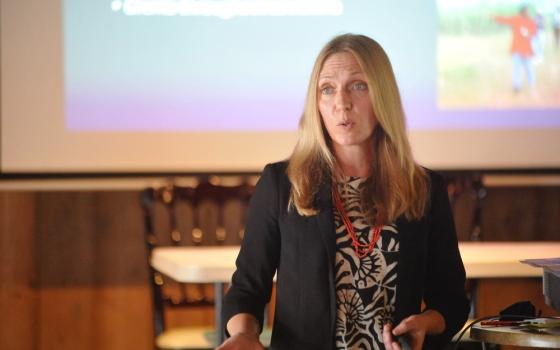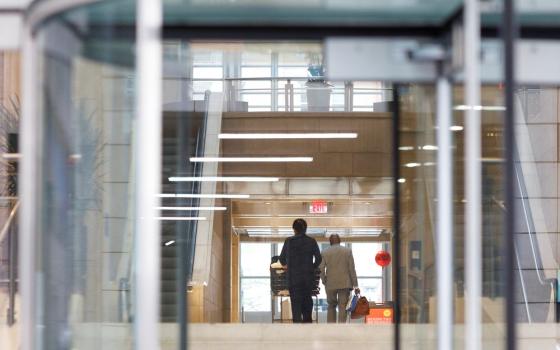Holy Week: Accompanying El Salvador
Gandhi once observed that if God were to come into our hungry world, it will surely be as bread.
Passover focuses the entire Jewish community on a meal, sustenance for the journey from slavery to freedom in a promised homeland where plentiful food would be the most tangible sign of God’s love. Wealth, someone else has said, is the power to eat, and this simple measure divides our world into nations so well fed they battle obesity and other nations where “food security” is the main preoccupation of the majority of the population. El Salvador is one of these.
 I review the digital pictures from my trip to El Salvador and I am shocked to admit that I am the largest body in every scene. At, age 64, 6 feet, 200 pounds, I am a veritable giant next to the Salvadoran men who live in the small farming town of San Carlos, where we spent the night as guests. The town is in San Vicente Department, an area held by the FMLN guerrillas during most of the war. Despite the peace accords, such areas, the people say, were abandoned by the right-wing ruling ARENA government when it came to funding and services, and, as others say, by the official Catholic church that, after Romero, continued to be divided between progressive Vatican II believers in the “church of the poor” and a deeply fervent faction clinging to a model of church with historical ties to the colonial era. In San Salvador, the division is reflected at the Cathedral in the “Upstairs Mass” for the traditional church and the “Downstairs Mass” of the “people’s church” in the crypt where the body of Monseñor Romero lies.
I review the digital pictures from my trip to El Salvador and I am shocked to admit that I am the largest body in every scene. At, age 64, 6 feet, 200 pounds, I am a veritable giant next to the Salvadoran men who live in the small farming town of San Carlos, where we spent the night as guests. The town is in San Vicente Department, an area held by the FMLN guerrillas during most of the war. Despite the peace accords, such areas, the people say, were abandoned by the right-wing ruling ARENA government when it came to funding and services, and, as others say, by the official Catholic church that, after Romero, continued to be divided between progressive Vatican II believers in the “church of the poor” and a deeply fervent faction clinging to a model of church with historical ties to the colonial era. In San Salvador, the division is reflected at the Cathedral in the “Upstairs Mass” for the traditional church and the “Downstairs Mass” of the “people’s church” in the crypt where the body of Monseñor Romero lies.
The Catholic church these days often seems to gather at two separate tables, a strain on the theme of unity at the heart of its own eucharistic theology, but this is the reality. Reconciliation, even within the church, has always been a scandalous work in progress. Passover, the Jewish foundation for Christian worship, was inseparable from the historical memory made present each year of the covenant God made with his people for both its political and liturgical life. Passover was the basis for a just economy, including care for widows, orphans and aliens, the vulnerable poor at the margins of every economy. The God who called the Hebrews out of Egypt is the God who always hears the cry of the poor, so true worship must leads to social justice.
Peruvian theologian Gustavo Gutierrez was in San Salvador for a conference tied to the Romero commemoration. The “liberation theology” he first articulated for Latin America in the 1960s was well grounded in the Mosaic covenant Jesus himself promoted in his preaching and ministry, first in lower Galilee and then all the way to Jerusalem, where an official inquisition awaited him in the Sanhedrin. His radical faith that there was only one God -- the God of the Poor -- would cost him his life. The Big Picture was orthodoxy, well enforced. Roman capitalism and Greek dualism underwrote an expanding empire, justifying the rapacious extraction of every valuable resource toward imperial coffers, land control and the cornering of every market for wheat, barley, wine and oil, flax and mineral, human trafficking of every kind. All roads led to Rome, and in the provinces, starvation was just another tool to control the population, too preoccupied with survival to think of liberation.
For Jesus, every meal was an occasion for community building, and his miraculous ability to find plenty in the midst of want, reconciliation and healing in open table fellowship, was a quiet declaration of independence from the divisive, fear of scarcity atmosphere Rome needed to drive its bread and circuses system of total social control. Anyone outside the system was a threat.
Spiritual salvation, a later abstraction of the Gospel message that God’s kingdom had come to earth in Jesus, was more Greek dualism than the Jewish embrace of the incarnate God who dotes on the poor, gives bread as readily as breath to his beloved children. Jesus declared himself the fulfillment of Isaiah’s promised servant: “The spirit of the Lord is upon me, has anointed me to bring good news to the poor, sight to the blind, freedom to captives and the oppressed, to announce a year of jubilee from the Lord,” the Mosaic call for regular economic redistribution of all of God’s gifts and the forgiveness of all indebtedness for the sake of the common good. This was good news to some and a disturbing challenge to others, the fourteen families of Jerusalem who owned everything.
It is the oldest story we know, and well-known in San Carlos, where after a rustic night with our gracious hosts, the SHARE group sat down to a sumptuous breakfast of beans and fried plantains, fruit and corn tortillas, coffee or, if you wish, a refreshing glass of CocaCola, safe from the bottle, the multinational’s answer to unfiltered local water systems teeming with bacteria. More presentations from community leaders revealed an amazing level of organization in the town, boards and committees working on every social challenge, especially the need to capture promised government funds for the regional school, where most of the 300 children who attend show up without breakfast, or for a clinic, or for funds to fix the roads and maintain the cement drainage channels needed to handle the summer rains and the swollen Lempe River that floods the town each season on its way to the Pacific Ocean, an hour’s drive to the south.
The town and others like it are models for civic responsibility and collegiality. Everyone who gets up to speak is self-assured and eloquent, proud to be involved. This empowerment is the fruit of decades of popular organizations that sprang like stubborn, lush foliage from seeds planted during the time of Romero, when daring Christian-based communities read the Bible together and discovered that the words and stories of Jesus were addressed directly to them about their own daily realities, their sufferings and their hopes for their children.
The words “food security” took on a heart-rending reality as we visited the school and were surrounded by eager children, whose desire to play cannot mask the sense that their bodies are too lean, their faces imperceptibly but still unmistakably transparent with malnutrition, an assault on crucial childhood development and needed immunity to preventable illnesses that rob the life spans of millions of people around the world. Is it them or is it my own dizzying sense that I am witnessed a kind of slow-motion emergency before me? I think of my own precious son’s early years in Topeka, Kansas, or the bright faces of the racing, shouting children in our neighborhood at home. What is wrong with this picture, and why am I holding back tears as we depart the dusty schoolyard in San Carlos?
Holy Thursday. Jesus kneels to wash a reluctant Peter’s feet, saying, “You do not understand what I am doing now, but later on you will.” Without knowing it, I have come to El Salvador to be baptized again from the bottom up, feet first, a traumatic and untimely breach birth for an oversized adult body I thought was almost finished and, of course, complete.
I am suddenly starving, not for comfort food, but for mercy and the bread of life. It is given freely, but it helps if you come hungry, or after a long fast to clear your head of false satisfactions and simple answers. This baptism happens when the easier, smoother road of reason and conventional truth runs out, and you find yourself invited to walk a harder road that teaches you how to love, which is never complete, never enough to get you off the hook, back to normal, ever again.
I am checked suddenly from free fall by the realization that it is still not too late to turn back. Soon I will be back home and this will all seem like a dream I can wake from. I can still escape. There are many roads I can take to help change the world, or some small part of it, closer to home, in my free time, as a volunteer, a generous donor. But this one, surely only fools take this road.
[Pat Marrin is editor of Celebration, NCR’s worship resource. He was in El Salvador covering the events surrounding the 30th anniversary of the assassination of Archbishop Oscar Romero, which was March 24.]
[Pat Marrin is editor of Celebration, NCR’s worship resource. He was in El Salvador covering the events surrounding the 30th anniversary of the assassination of Archbishop Oscar Romero, which was March 24.]
March 29: Holy Week 2010: Accompanying El Salvador, an introduction
March 30: Anointing
March 31: Darkness will have its hour
April 1, Holy Thursday: Fools rush in
April 2, Good Friday: Know when to fold 'em
April 3, Easter Vigil: Know when to hold 'em
| See also |



